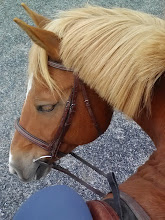Extraordinary glimpses into the natural life of the Cape Cod coast this past Thanksgiving weekend left us with a sense of wonder and humility, not an unusual reaction to being home, but striking in the connection these collective experiences gave all of us who shared in them. We were open to them, excited by them and blessed to witness them.
The runners among us discovered the turkeys on North Pamet Rd, a flock of a dozen or so, pecking along the side of the road into a driveway. Fearless, they parted as Hal ran through them, dark headed females and colorful males. Being in the feasting mode, we thought some might be killed off to roast and sit on someone's table, although we knew the timing was wrong. The relief was great, nevertheless, when the same flock was spotted, unafraid, having their own feast the next day.
Early Thanksgiving morning, we went with Bhuie down the path to the Pamet, where the tide was approaching its high point. Into the strong east-bound current, in true bold labrador style, Bhuie lept after her tennis ball as three great blue herons flew cawking overhead, not too concerned by our activity but apparently intent on following their particular daily routines. The peaceful, beloved sweep of the river, browned by the autumn, dormant for the winter, breathed into us its timelessness, its being, its song, and we gave thanks.
Later, in the still damp air, we heard the muffled pounding of the rollers breaking across the sandy shoals toward the Great Beach as we walked the sandy path surrounded by scrub oak and pine lining gentle rises and dips. We had heard from Amy that there was a pod of whales playing off the shore and we hoped to see them. Crossing to the dune, we spotted Rob and Bhuie on the overlook and joined them there.
A distant fountain showed just below the horizon, joined by another, a glistening dark back briefly showing, then more to the south, backs, spouts and an occasional tail, circling gulls and disturbed water. We has been on time for the whales, after all. They, feeding, shared their playfulness with us as they, too, enjoyed their Thanksgiving feast. Their table was set for six to eight and we could imagine them telling those stories best saved for family gatherings, what Auntie did, what Grandpa said, what they did when the whale boat trips waited for a show last summer.
We left the Cape yesterday, refreshed, grounded and happy to be part of this amazing natural world.
And what has this above to do with the development of classical principles of horsemanship? Well, nothing and everything.
In domesticating the horse, indeed all animals we use for our necessities, we take them from their habitat and social structure and impose our limitations upon them. Where we can observe creatures in the wild, by taming these creatures, we change the species dynamic. Herd situations may remain, but only at the will of the human keepers. A new and permanent element has superceeded the equine instinct. We have made a deal with the horse 'If you allow us to make use of your strength, we will provide all your basic needs'.
The key word here is 'allow', as it implies willingness on the part of the horse to work with us. It implies a mutual relationship where we, in turn, allow the horse to do the jobs we ask of it. We allow the horse to stretch toward our hands, or to find the trail on its own, or we allow with our hands over the top of a jump, allowing the horse to clear the obstacle in safety.
So, too, is the training process a building of a partnership, a marriage of two merging into one, stronger than each individual alone. We show the horse what we want, we encourage it to act counter-intuitively, trusting us to make decisions for it. We are responsible for developing the carrying muscles of our horse, that it can perform the work required. We treat our horse with dignity, being sensitive to its needs. We reward and correct with kindness, with clarity.
Simply put, this is the basis of the classical tradition of horsemanship. Beginning with the writing of Xenophon to the present day, this tradition emphasizes communication based on the ability of the equine species to understand. It is a language of the body and subtle fluctuations of energy. It respects and builds its curriculum on the horse's unique and remarkable sensitivity to the world around it.
We have been humbled by the whales, the turkeys and the herons because they have allowed us to observe them unfettered. We are humbled by the horses because they allow us to share in their view of the world while doing our bidding.
An incredible thing, this.
Labels: Cape Cod, classical horsemanship, herons, Pamet River, symbiosis, turkeys, whales


2 Comments:
It's great reading your blog :) I wish I was there, hope to see some pictures.
You have won an award go to http://journeysofcactusjack.blogspot.com/ to pick it up
Post a Comment
Subscribe to Post Comments [Atom]
<< Home